Review: ‘Death and the Penguin’ by Andrey Kurkov
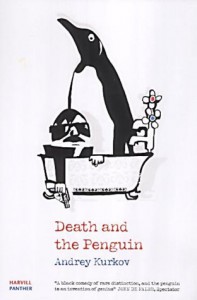 Victor is depressed: his lover has dumped him, his short stories are too short and the light has gone off in his dingy apartment. His only companion is Misha, the penguin he rescued from Kiev’s Zoo, when it couldn’t feed the animals anymore. Misha is the silent witness to Victor’s despair. Misha joins in his celebration – fish and vodka – when Victor’s luck seems to turn: He is commissioned to write obituaries under the pen-name “A Group of Friends”. The weird thing is that the editor wants him to select subjects who are still alive, the movers and the shakers of the new, post-Communist society. Pleased with Victor’s work the editor sends him his friend, also called Misha, and from then onwards known as Misha non-penguin, who commissions Victor to write an obituary about one of his shady associates. After a job-well-done Misha non-penguin and Victor get drunk on vodka and Victor confesses that he is frustrated as an obituary writer: his subjects refuse to die. The next morning his most prominent one, a corrupt politician with Mafia ties and a mistress, is dead. The tide has turned. (Goodreads Summary)
Victor is depressed: his lover has dumped him, his short stories are too short and the light has gone off in his dingy apartment. His only companion is Misha, the penguin he rescued from Kiev’s Zoo, when it couldn’t feed the animals anymore. Misha is the silent witness to Victor’s despair. Misha joins in his celebration – fish and vodka – when Victor’s luck seems to turn: He is commissioned to write obituaries under the pen-name “A Group of Friends”. The weird thing is that the editor wants him to select subjects who are still alive, the movers and the shakers of the new, post-Communist society. Pleased with Victor’s work the editor sends him his friend, also called Misha, and from then onwards known as Misha non-penguin, who commissions Victor to write an obituary about one of his shady associates. After a job-well-done Misha non-penguin and Victor get drunk on vodka and Victor confesses that he is frustrated as an obituary writer: his subjects refuse to die. The next morning his most prominent one, a corrupt politician with Mafia ties and a mistress, is dead. The tide has turned. (Goodreads Summary)
‘Death and the Penguin’ is one of those books which shouldn’t work, but somehow it does. It’s a novel which address serious themes of death, loneliness and the casually oppressive nature of post-Soviet society in Ukraine, and yet it does so with humour. And a penguin.
The story of Viktor, a struggling writer who gets a job writing obituaries for people while they are alive who then strangely start dying off, is enjoyable and written in such a way that it seems perfectly logical rather than as unbelieveable as it should. Andrey Kurkov’s deadpan narrative style works perfectly in this book. It is impossible not to laugh at the very serious way in which Viktor takes his penguin to go swimming in the frozen river, but wraps him up in a towel when he emerges so that he doesn’t get cold. Equally amusing is the thought of someone going into hiding and taking a penguin (not exactly inconspicuous) with him. In a novel in which most relationships are simply based on the characters wanting something out of each other for their own personal benefit, the peculiar bond between Viktor and Misha the penguin stands out and is oddly touching. I expected the penguin to be responsible for a lot of the humour in the book, but not for the emotion as well.
Death and the Penguin by Andrey Kurkov. Published by Harville, 2002, pp. 228. Originally published in 1996.
N.B. This is an old review written in 2010 and posted on Goodreads and LibraryThing before I started keeping track of all the books I read here at Old English Rose Reads. I’ve decided to keep copies here so that this remains a complete record of my reading since I started reviewing books for my own pleasure.
Review: ‘The Cigarette Girl’ by Carol Wolper
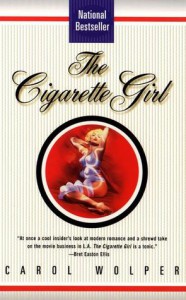 Elizabeth West is twenty-eight, which means she’s just entered The Zone–that seven-year span in a woman’s life when the pressure to find Mr. Right is at its most intense. For Elizabeth, however, the quest is not about Mr. Right so much as it is about Mr. Maybe. And on some nights, all she’s looking for is a little distraction… What complicates Elizabeth’s quest are the particulars of her situation. She is a writer of testosterone-heavy screenplays–the blow-’em-up vehicles for eight-figure stars and their bad-boy directors–and therefore deals on a daily basis with men who traffic nearly exclusively in bimbos, which, like smog and palm trees, are a fixture of the L.A. landscape. Though her job requires her to sound like one of the boys (sample dialogue: “I don’t deal with dickbrains”), she’s very much a girl, from her cell-phone codependency to her chronic attraction to dangerous men. With her female friends succumbing to marriage or morphing into Spermtrappers (women who hunger to be impregnated–husband optional), Elizabeth finds herself questioning the long-term benefits of remaining an SCU (self-contained unit) and looking with new eyes at the mating options around her. (Goodreads Summary)
Elizabeth West is twenty-eight, which means she’s just entered The Zone–that seven-year span in a woman’s life when the pressure to find Mr. Right is at its most intense. For Elizabeth, however, the quest is not about Mr. Right so much as it is about Mr. Maybe. And on some nights, all she’s looking for is a little distraction… What complicates Elizabeth’s quest are the particulars of her situation. She is a writer of testosterone-heavy screenplays–the blow-’em-up vehicles for eight-figure stars and their bad-boy directors–and therefore deals on a daily basis with men who traffic nearly exclusively in bimbos, which, like smog and palm trees, are a fixture of the L.A. landscape. Though her job requires her to sound like one of the boys (sample dialogue: “I don’t deal with dickbrains”), she’s very much a girl, from her cell-phone codependency to her chronic attraction to dangerous men. With her female friends succumbing to marriage or morphing into Spermtrappers (women who hunger to be impregnated–husband optional), Elizabeth finds herself questioning the long-term benefits of remaining an SCU (self-contained unit) and looking with new eyes at the mating options around her. (Goodreads Summary)
This book, despite not being my sort of thing, started out quite well. The dialogue was reasonably witty and, although there’s no substance to this book at all, it was light and frothy and quite entertaining. Unfortunately it soon went flat as the sharp one-liners gave way to hormone-laden hand-wringing about finding the right man. Not only the ending but a good three quarters of the book were completely dissatisfying.
I objected to the style of writing, which, aside from the aforementioned witty one-liners, was rather dull. Carol Wolper has an incredibly annoying trick of saying “And then I thought this: (insert vapid thought here)” rather than letting the reader experience what the character is thinking. It’s a first person narrative; it’s already obvious that what I’m reading is what the character is thinking, thank you, I don’t need to be told. I also thought that the sections written as screenplay added nothing to the book. They were infrequent enough that they didn’t create a coherent thread running through the book, and their use seemed random rather than a deliberate device to highlight the most important events. When they did come along, they just seemed like a lazy way of writing the same thing, rather than the clever glimpse into the mind of the scriptwriting narrator that they were undoubtedly intended to be.
The Cigarette Girl by Carol Wolper. Published by Pan, 2000, pp. 336. Originally published in 1999.
N.B. This is an old review written in 2010 and posted on Goodreads and LibraryThing before I started keeping track of all the books I read here at Old English Rose Reads. I’ve decided to keep copies here so that this remains a complete record of my reading since I started reviewing books for my own pleasure.
Review: ‘Mrs Shakespeare’ by Robert Nye
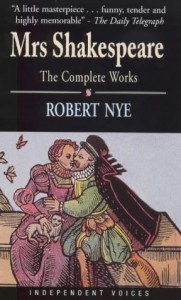 Writing her memoirs seven years after her husband’s death, Anne Hathaway reminisces about her now-famous husband, recalling in particular that week in April, 1594, when the still-struggling poet and playwright invited her to London to celebrate his thirtieth birthday, and what happened to her in a certain strange bed in his lodgings above a fishmonger’s shop. In telling that story, and any others, she casts a brilliant new light on Shakespeare-a very close look at the master by one who shared his bed but never bothered to read him. This is a riot of scholarship and bawdy writing. (Goodreads Summary)
Writing her memoirs seven years after her husband’s death, Anne Hathaway reminisces about her now-famous husband, recalling in particular that week in April, 1594, when the still-struggling poet and playwright invited her to London to celebrate his thirtieth birthday, and what happened to her in a certain strange bed in his lodgings above a fishmonger’s shop. In telling that story, and any others, she casts a brilliant new light on Shakespeare-a very close look at the master by one who shared his bed but never bothered to read him. This is a riot of scholarship and bawdy writing. (Goodreads Summary)
The attraction of this book is without doubt the wonderful character and narrative voice that Nye has created for the eponymous Mrs Shakespeare. She is earthy and practical, writing with a straightforward and direct tone which is full of bathos and the perfect contrast to her husband’s elegant, playful tones. I enjoyed the way that she deliberately avoids using metaphor and simile as she considers these dishonest ways of speaking, and her down to earth deconstruction of the sonnet Shakespeare gives to her is a stroke of comic genius.
This book uses one fictional event, the visit of Anne Hathaway to her husband in London in 1594, as a lens through which to examine the possible relationship between Shakespeare and his much neglected wife. Throughout her story are anecdotes and thoughts taken from Shakespeare’s plays and I had fun spotting and identifying these. In particular, this book creates a reason behind Shakespeare’s odd-sounding bequest to his wife of the second best bed. I thought that this section of the novel, focussing on the unusual relations enjoyed my Mr and Mrs Shakespeare in the second best bed, was useful in that it explored the different reactions to and motivations for physical pleasure of the two main characters. However, it did become rather overstated and was a disproportionately long section in what is a short novel. On the whole though, I enjoyed the irreverent tone of the whole book, and found it to be a good read.
Mrs Shakespeare by Robert Nye. Published by Souvenir Press, 2000, pp. 224. Originally published in 1993.
N.B. This is an old review written in 2010 and posted on Goodreads and LibraryThing before I started keeping track of all the books I read here at Old English Rose Reads. I’ve decided to keep copies here so that this remains a complete record of my reading since I started reviewing books for my own pleasure.
Review: ‘The Breaking of the Shell’ by Barry Durdant-Hollamby
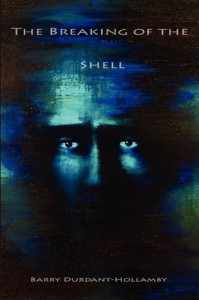 When a horrible tragedy strikes during an innocent childhood game, six year old Alexander Baker’s life is changed forever. It will be many years before the outcome of that day is finally discovered – with consequences that will not only help Alexander to heal his deepest wounds, but also engage him in a process that could lead to global transformation. The Breaking of the Shell is a fascinating story of self-discovery written in a biographical style that explores themes of death, relationship, sexuality, spirituality and material wealth in ways which are sometimes surprising, often humorous and always inspiring. (Goodreads Summary)
When a horrible tragedy strikes during an innocent childhood game, six year old Alexander Baker’s life is changed forever. It will be many years before the outcome of that day is finally discovered – with consequences that will not only help Alexander to heal his deepest wounds, but also engage him in a process that could lead to global transformation. The Breaking of the Shell is a fascinating story of self-discovery written in a biographical style that explores themes of death, relationship, sexuality, spirituality and material wealth in ways which are sometimes surprising, often humorous and always inspiring. (Goodreads Summary)
I feel slightly guilty about not giving this book a good review, as I was sent a free review copy through the Good Reads First Reads programme. I really wanted to like it and be able to say nice things about it, but sadly I can’t. This book should have been given a subtitle; it should have been ‘The Breaking of the Shell: How to Improve your Life and Relationships through Active Listening and Responding to your Emotions’. This book was not a novel, but a poorly disguised self-help book masquerading as a novel to lure poor, unsuspecting people who usually wouldn’t touch such a book with a bargepole (such as myself) into reading it.
Perhaps because the storyline isn’t the main point of this book, it is neither very interesting nor particularly tightly written. At times, such as in the case of the dictaphone, it contradicts itself: Alexander initially listens to the recording in order to hear his father’s declaration of love and yet, when listening to the recording on a later occasion, is surprised to hear the very same at the start of the tape as he hadn’t realised it had been recorded. The character of Helen is introduced without any explanation: she is living with Alexander so I assumed she was his wife, then his girlfriend when that didn’t quite work out, until the first person narrator finally sees fit to tell the reader who this person is (his ex-wife, it transpires). Her characterisation is also inconsistent with what the reader is told: Alexander reports that ‘Helen One’ was dejected and self-doubting, whereas ‘Helen Two’ who emerges after the divorce is confident and bright, but it is impossible to tell the difference between the two Helens when reading through the before and after narratives. The miraculous changes in Alexander are similarly underwhelming and unapparent. It is difficult to see ‘the incident with the garden shed’ (yes, those are the exact words used) as the root of all Alexander’s problems when the author has gone to great lengths to establish that his problems with emotions started before this point and moreover when the ‘incident’ is forgotten and never referred to again for fully half the book. His putative change back into someone who is in touch with his emotions also fails because he isn’t enough of a bastard beforehand for this to be anything spectacular; he’s just a bit misguided and whiney. The lack of any particularly dramatic change in any of the characters means that there is no interesting and satisfying dénouement to this book. Instead, it just sort of peters out long after the time when it should have been put out of its misery.
Apparently the exciting climax of this book is supposedly the earth-shattering discovery that listening to other people and engaging with them makes the world a better place and people happier with each other and themselves (something I’m fairly sure most people could tell you without the aid of this book). At the point when this was discovered any attempt at plot that was anything other than a demonstration of how this system works disappeared entirely. Instead, the reader is treated to descriptions of parents listening to their children, businessmen listening to each other and ultimately the government listening to the people, which is admirable but really not very interesting. Had the narrative up to this point been particularly engaging I might have been able to forgive the new age, touchy feely instructions for self-discovery and the incredible lack of subtlety with which the author set about grinding his own personal axes. As it is, I was left disappointed.
The Breaking of the Shell by Barry Durdant-Hollamby. Published by the art of change, 2010, pp. 334. First edition.
N.B. This is an old review written in 2010 and posted on Goodreads and LibraryThing before I started keeping track of all the books I read here at Old English Rose Reads. I’ve decided to keep copies here so that this remains a complete record of my reading since I started reviewing books for my own pleasure.
Review: ‘Ithaka’ by Adele Geras
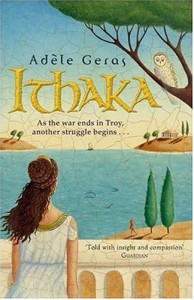 Many years have passed since the end of the Trojan War, and Penelope is still waiting for her husband, Odysseus, to return home. The city of Ithaka is overrun with uncouth suitors from the surrounding islands who are vying to win Penelope’s hand in marriage, thereby gaining control of the land. When a naked, half-drowned man washes up on the beach, everything changes. Told through the eyes of Klymene, a young girl who is like a daughter to Penelope–and who longs for more than friendship from the young prince Telemachus–Ithaka captures the quiet strength and patience of a woman’s enduring love for her husband and the ensuing chaos that threatens all as Penelope is pressured to remarry. (Goodreads Summary)
Many years have passed since the end of the Trojan War, and Penelope is still waiting for her husband, Odysseus, to return home. The city of Ithaka is overrun with uncouth suitors from the surrounding islands who are vying to win Penelope’s hand in marriage, thereby gaining control of the land. When a naked, half-drowned man washes up on the beach, everything changes. Told through the eyes of Klymene, a young girl who is like a daughter to Penelope–and who longs for more than friendship from the young prince Telemachus–Ithaka captures the quiet strength and patience of a woman’s enduring love for her husband and the ensuing chaos that threatens all as Penelope is pressured to remarry. (Goodreads Summary)
I have read and loved ‘The Odyssey’ and I have read and loved Margaret Atwood’s brilliant adaptation of the myth in ‘The Penelopiad’, both of which are fantastic pieces of literature. Unfortunately, ‘Ithaka’ feels very much like the poor relation: it lacks the poetry and beauty of the original and the wit and courage of Atwood’s version. I appreciate that this is a young adult book, but that does not excuse its clunky prose and lack of conviction in its own story.
When a writer chooses to develop a well known myth with archetypal characters it seems that there are two ways to go: either the characters behave as they do in the original piece and the book becomes an interesting companion to that original, developing different aspects reflecting the author’s own particular slant, or alternatively the author turns the characters entirely on their heads, making them interestingly different and so showing the original story in a new light. Sadly, this book seemed to waver between the two and so achieved neither aim. The whole point of Homer’s Penelope is that she waits faithfully for the return of Odysseus, but this book saw her both fall in love with and repeatedly have sex with one of the suitors. I feel that this could potentially have been a very interesting development to Penelope’s character (Odysseus, after all, is far from faithful to her during the same time), but instead it was inconsistent, pointless and was terribly out of place when the author returned to the original Homeric ending. It could have worked, but it didn’t.
Odysseus, when he eventually appeared, was equally unsatisfying. Given the casually bloodthirsty tone of Adele Geras’ other novel of ancient Greece, ‘Troy’, I wasn’t expecting Odysseus to be so soft. Some of the suitors are allowed to flee, and the killing of all Penelope’s handmaidens is removed altogether. I had expected Klymene, the rather insipid main character, to escape the slaughter but for it not to happen at all changes Odysseus a lot.
Although I try not to be too bothered by anachronisms in historical fiction, I found the repeated use of the word ‘crap’ to be particularly jarring and modern. Equally, there seemed to be a remarkable lack of pregnancy considering the promiscuity of some of the characters and the general dearth of contraception in ancient Greece. But without doubt the thing that annoyed me most about this book was the use of the gods. Sometimes they appeared in order to be involved in the plot or change the direction of the narrative, but most often they just seemed to appear for a quick chat which had no influence on the story whatsoever and so they lost any significance that they might have had.
Ithaka by Adele Geras. Published by Corgi, 2006, pp. 416. Originally published in 2005.
N.B. This is an old review written in 2010 and posted on Goodreads and LibraryThing before I started keeping track of all the books I read here at Old English Rose Reads. I’ve decided to keep copies here so that this remains a complete record of my reading since I started reviewing books for my own pleasure.
Review: ‘A Short History of Tractors in Ukranian’ by Marina Lewycka
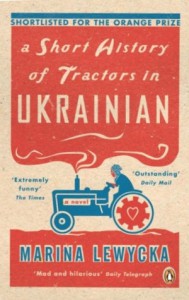 When their recently widowed father announces that he plans to remarry, sisters Vera and Nadezhda realize that they must learn to put aside a lifetime of bitter rivalry in order to save him. The new woman in his life is Valentina, a voluptuous gold-digger from Ukraine, fifty years his junior, with fabulous breasts and a proclivity for green satin underwear and boil-in-the-bag cuisine, who will stop at nothing in her single-minded pursuit of the luxurious Western lifestyle she dreams of. But separating their addled and annoyingly lecherous dad from his new love will prove to be no easy feat-in terms of sheer cold-eyed ruthlessness, the two sisters swiftly realize that they are rank amateurs. As Hurricane Valentina turns the old family house upside down, all the old secrets come falling out, including the most deeply buried one of them all, from the war, the one that explains much about why Nadezhda and Vera are so different. In the meantime, oblivious to it all, their father carries on with the great work of his dotage-a grand history of the tractor and its role in human progress, giving due credit to the crucial Ukrainian contribution. The story carries us back to prerevolutionary Ukraine, through wartime Germany, to contemporary England, taking in love and suffering, tanks and tractors, bitchiness, sibling rivalry, and, above all, the joys of growing old disgracefully. (Goodreads Summary)
When their recently widowed father announces that he plans to remarry, sisters Vera and Nadezhda realize that they must learn to put aside a lifetime of bitter rivalry in order to save him. The new woman in his life is Valentina, a voluptuous gold-digger from Ukraine, fifty years his junior, with fabulous breasts and a proclivity for green satin underwear and boil-in-the-bag cuisine, who will stop at nothing in her single-minded pursuit of the luxurious Western lifestyle she dreams of. But separating their addled and annoyingly lecherous dad from his new love will prove to be no easy feat-in terms of sheer cold-eyed ruthlessness, the two sisters swiftly realize that they are rank amateurs. As Hurricane Valentina turns the old family house upside down, all the old secrets come falling out, including the most deeply buried one of them all, from the war, the one that explains much about why Nadezhda and Vera are so different. In the meantime, oblivious to it all, their father carries on with the great work of his dotage-a grand history of the tractor and its role in human progress, giving due credit to the crucial Ukrainian contribution. The story carries us back to prerevolutionary Ukraine, through wartime Germany, to contemporary England, taking in love and suffering, tanks and tractors, bitchiness, sibling rivalry, and, above all, the joys of growing old disgracefully. (Goodreads Summary)
The reviews on the cover of this book claim that it is ‘extremely funny’ and ‘mad and hilarious’. While these reviews may be true – the book is indeed very funny – they present a distinctly biased, innacurate picture of what the book is like. The reviews suggest that this novel is a light-hearted and frivolous comedy, but this is far from being the case.
Although the book maintains an almost constant comic tone and has its moments of levity, but the overwhelming impression is of something darker. At times, the story was desperately and surprisingly sad. The more usual humourous tone arises from interactions between the delightful cast of characters who are bitter and resentful, sad and lonely, or an interesting blend of other negative emotions, as they snipe at each other. Throughout the book I was continually aware that when I was laughing, I was laughing at someone and I felt slightly guilty about doing it. The spiteful bickering and snide remarks eventually lead to greater understanding between the characters and a satisfying, happy conclusion, but they do comprise the majority of the book. I liked the book a lot and at times it made me laugh out loud, it was just very different from the happy families comedy I was expecting.
A Short History of Tractors in Ukranian by Marina Lewycka. Published by Penguin, 2006, pp. 325. Originally published in 2005.
N.B. This is an old review written in 2010 and posted on Goodreads and LibraryThing before I started keeping track of all the books I read here at Old English Rose Reads. I’ve decided to keep copies here so that this remains a complete record of my reading since I started reviewing books for my own pleasure.
Review: ‘The Magician’s Guild’ by Trudi Canavan
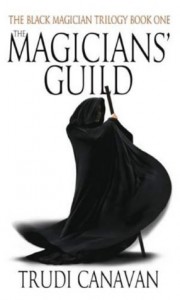 This year, like every other, the magicians of Imardin gather to purge the city of undesirables. Cloaked in the protection of their sorcery, they move with no fear of the vagrants and miscreants who despise them and their work—until one enraged girl, barely more than a child, hurls a stone at the hated invaders . . . and effortlessly penetrates their magical shield. What the Magicians’ Guild has long dreaded has finally come to pass. There is someone outside their ranks who possesses a raw power beyond imagining, an untrained mage who must be found and schooled before she destroys herself and her city with a force she cannot yet control. (Goodreads Summary)
This year, like every other, the magicians of Imardin gather to purge the city of undesirables. Cloaked in the protection of their sorcery, they move with no fear of the vagrants and miscreants who despise them and their work—until one enraged girl, barely more than a child, hurls a stone at the hated invaders . . . and effortlessly penetrates their magical shield. What the Magicians’ Guild has long dreaded has finally come to pass. There is someone outside their ranks who possesses a raw power beyond imagining, an untrained mage who must be found and schooled before she destroys herself and her city with a force she cannot yet control. (Goodreads Summary)
This was a typical, good fantasy book. There was nothing startlingly new about it, but the story was engaging and fast-paced, the characters were likeable or enjoyably not so, and the world was well-defined and interesting.
It has to be said, very little happens in this book in terms of actual plot progression. I felt that, rather than being the first book of a trilogy, this was the first third of a story which just happens to be divided into three separate books. It makes the individual book less satisfying, but I hope that all three are going to cumulatively create one great story.
The Magician’s Guild by Trudi Canavan. Published by Orbit, 2004, pp. 469. Originally published in 2001.
N.B. This is an old review written in 2010 and posted on Goodreads and LibraryThing before I started keeping track of all the books I read here at Old English Rose Reads. I’ve decided to keep copies here so that this remains a complete record of my reading since I started reviewing books for my own pleasure.
Review: ‘The Affinity Bridge’ by George Mann
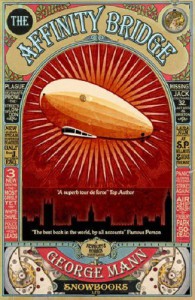 Welcome to the bizarre and dangerous world of Victorian London, a city teetering on the edge of revolution. Its people are ushering in a new era of technology, dazzled each day by new inventions. Airships soar in the skies over the city, whilst ground trains rumble through the streets and clockwork automatons are programmed to carry out menial tasks in the offices of lawyers, policemen and journalists. But beneath this shiny veneer of progress lurks a sinister side. For this is also a world where ghostly policemen haunt the fog-laden alleyways of Whitechapel, where cadavers can rise from the dead and where Sir Maurice Newbury , Gentleman Investigator for the Crown, works tirelessly to protect the Empire from her foes. When an airship crashes in mysterious circumstances, Sir Maurice and his recently appointed assistant Miss Veronica Hobbes are called in to investigate. Meanwhile, Scotland Yard is baffled by a spate of grisly murders and a terrifying plague ravaging the slums of the city. (Goodreads Summary)
Welcome to the bizarre and dangerous world of Victorian London, a city teetering on the edge of revolution. Its people are ushering in a new era of technology, dazzled each day by new inventions. Airships soar in the skies over the city, whilst ground trains rumble through the streets and clockwork automatons are programmed to carry out menial tasks in the offices of lawyers, policemen and journalists. But beneath this shiny veneer of progress lurks a sinister side. For this is also a world where ghostly policemen haunt the fog-laden alleyways of Whitechapel, where cadavers can rise from the dead and where Sir Maurice Newbury , Gentleman Investigator for the Crown, works tirelessly to protect the Empire from her foes. When an airship crashes in mysterious circumstances, Sir Maurice and his recently appointed assistant Miss Veronica Hobbes are called in to investigate. Meanwhile, Scotland Yard is baffled by a spate of grisly murders and a terrifying plague ravaging the slums of the city. (Goodreads Summary)
Set in an alternative Victorian London populated with mysterious scientists, brass automatons, airships and zombies, this book was very silly but also very entertaining.
At times it seems as though Mann has a few too many subplots on the go at once and that certain aspects are being ignored for too long. However, he handles them all skilfully and eventually they become so impressively interwoven and dependent upon one another that I was willing to forgive their seemingly disparate nature because of the way they come together so spectacularly in the end.
The rapid pace of the plot admittedly didn’t allow for much character development, but in my opinion many mystery stories of this sort employ stock characters (the Butler, the Village Gossip, the Policeman with a Secret etc.) so this wasn’t particularly surprising for the peripheral characters. I have every faith that Newbury and Hobbes themselves, already made interesting through several tantalising hints, will be more fully fleshed out with each further encounter with the pair. There are a lot of Victorian English stereotypes to be found, but some were played with beautifully (I particularly enjoyed Queen Victoria herself). Besides, what situation can’t be made better by a pot of Earl Grey?
So yes, the book does suffer from some inconsistencies, the storyline is utterly improbable and the characters are a little one dimensional, but this book is still a lot of fun to read.
The Affinity Bridge by George Mann. Published by Snowbooks, 2008, pp. 350. Originally published in 2008.
N.B. This is an old review written in 2010 and posted on Goodreads and LibraryThing before I started keeping track of all the books I read here at Old English Rose Reads. I’ve decided to keep copies here so that this remains a complete record of my reading since I started reviewing books for my own pleasure.
Review: ‘Interview with the Vampire’ by Anne Rice
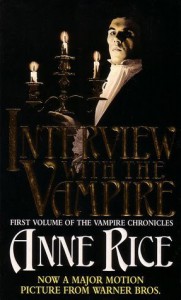 This is the book that started it all. We are in a small room with the vampire, face to face, as he speaks–as he pours out the hypnotic, shocking, moving, and erotically charged confessions of his first two hundred years as one of the living dead. (Goodreads Summary)
This is the book that started it all. We are in a small room with the vampire, face to face, as he speaks–as he pours out the hypnotic, shocking, moving, and erotically charged confessions of his first two hundred years as one of the living dead. (Goodreads Summary)
I read this book hoping for a take on the vampire story which was different from the rash of alternately saccharine and soft core porn vampire novels which proliferate at the moment, and it was indeed different. However, it seems that darker does not necessarily mean better and apparently it also does not mean I’m any more likely to enjoy it.
Yes, this book is dark, but it’s dark all the time and clearly takes itself very seriously. There are no moments of levity to break the monotonous, stifling morbidity, and while I appreciate this is the tone of the book, there are a lot of wasted opportunities for some delicious black humour which would have been the perfect accent to it. Louis’ constant philosophising which helps to flesh out Rice’s take on the vampire myth wandered between being pompous and being whiney and once again shows a complete lack of irony or self-reflection, even though the eponymous vampire is supposedly looking back on these thoughts from the distance of many years. The interview device which facilitated this is, at best, inconsistently maintained. Great swathes of text went by without any recourse to the interviewer, and I thought that better use could have been made of this neglected outsider perspective.
That said, there were some aspects of the novel that I enjoyed. Claudia is a fabulous character, far more interesting than the insipid narrator. I also appreciate the way that Rice gives the narrative a seductively sensual quality without ever having any of the characters have sex. This gives her writing a class and elegance which I find lacking in modern vampire books. It was also an enormous relief to see the word ‘velvet’ only ever used in the context of fabric (Christine Feehan, I’m looking at you). Nonetheless, this book just wasn’t for me, but I can see why so many people enjoy it.
Interview with the Vampire by Anne Rice. Published by Warner, 1994, pp. 368. Originally published in 1976.
N.B. This is an old review written in 2010 and posted on Goodreads and LibraryThing before I started keeping track of all the books I read here at Old English Rose Reads. I’ve decided to keep copies here so that this remains a complete record of my reading since I started reviewing books for my own pleasure.
Review: ‘Anna Karenina’ by Leo Tolstoy
Married to a powerful government minister, Anna Karenina is a beautiful woman who falls deeply in love with a wealthy army officer, the elegant Count Vronsky. Desperate to find truth and meaning in her life, she rashly defies the conventions of Russian society and leaves her husband and son to live with her lover. Condemned and ostracized by her peers and prone to fits of jealousy that alienate Vronsky, Anna finds herself unable to escape an increasingly hopeless situation. Set against this tragic affair is the story of Konstantin Levin, a melancholy landowner whom Tolstoy based largely on himself. While Anna looks for happiness through love, Levin embarks on his own search for spiritual fulfillment through marriage, family, and hard work. Surrounding these two central plot threads are dozens of characters whom Tolstoy seamlessly weaves together, creating a breathtaking tapestry of nineteenth-century Russian society. (Goodreads Summary)
This book was my first foray into Russian literature, and I could not have had a better introduction. Tolstoy has a way of phrasing the thoughts and feelings of the characters that is so insightful, precise and identifiable that it easily transcends the innumerable differences between a modern reader and the selection of people he focuses on living in nineteenth century Russia. They are all incredibly psychologically developed and I felt as if I knew them all personally and could predict how they might react in any given situation. Tolstoy also colours his narrative so that it is seen through the eyes of the different characters, giving the reader many different viewpoints from which to perceive events and settings and so making the novel very rich. A scene from the perspective of Oblonsky, for example, is light, frivolous and faintly cynical, whereas the same situation seen through Levin’s eyes is thoughtful and earnest.
Unfortunately, while the human drama of the novel has stood the test of time admirably, much of Tolstoy’s social commentary has not fared so well. The sections on social economy, agriculture and political systems may have ben fascinating to a contemporary Russian reader but I found them lengthy, tedious, unnecessary and, dare I say it, dull. However, I’m more than willing to ignore the effect of these passages in light of the sheer brilliance of the rest of the book.
This particular translation (Penguin, 1954, this edition 2000) by Rosemary Edmonds is fantastic. Her prose is readable and appropriate, so that the book does not read like translated literature at all, but like any other nineteenth century novel. The illusion was so well-executed that the only time I was made aware that I wasn’t reading original language literature was when characters discussed which pronouns to use to refer to one another, an aspect of language which is absent from modern English. Both the translation and the original writing make this a thoroughly excellent book.
Anna Karenina by Leo Tolstoy, translated from the Russian by Rosemary Edmonds. Published by Penguin, 2005, 853. Originally published in 1873.
N.B. This is an old review written in 2010 and posted on Goodreads and LibraryThing before I started keeping track of all the books I read here at Old English Rose Reads. I’ve decided to keep copies here so that this remains a complete record of my reading since I started reviewing books for my own pleasure.
